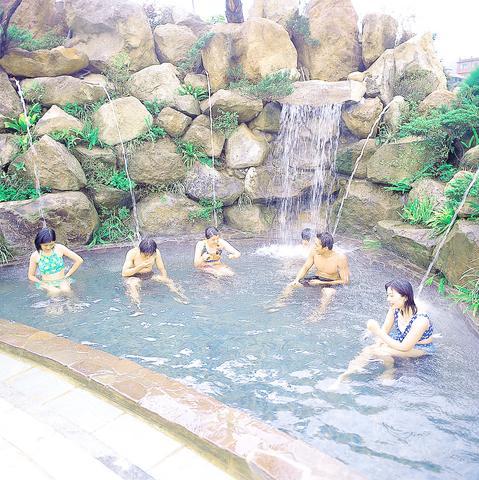As SARS continues to upset the routines of everyday life and people stay at home rather than risk going out, many businesses are suffering from the effects of the pernicious disease.
Dimmed by the market slowdown, a number of local companies are now coming up with all kinds of bright ideas in the hope of offsetting their losses.

PHOTO COURTESY OF TIEN LAI SPRING RESORT
The familiar practice of low pricing has been effective in bringing back some customers, but hot spring resorts have gone a step further with their claims that a soak in a hot spring pool is so good for you it can boost the immune system and help defend the body against SARS.

PHOTO COURTESY OF TIEN LAI SPRING RESORT
Lucy Lee (
A different tack has been taken by two resorts on Yangmingshan, at Peitou (北投) and Kinshan (金山). They are trying to attract the general public by promoting the idea that one of the most effective ways of beating SARS is to take a healthy hot spring, away from the disease's hot spots in the city and enjoy gourmet food at a scenic hideaway.
As a result of these promotional efforts, or perhaps because they are ready to get back to normal life, people in Taipei have responded to the calls of the hot spring owners, as the large number of visitors to resort hotels on Yangminshan last weekend showed.
The hot springs in these areas mostly originate from the Tatun mountain range (
Bathing in hot springs is a favorite leisure activity of many Taiwanese that was picked up from the Japanese during the 50-year colonial-rule period beginning in 1895. In Japan the merits of taking a daily dip in the hot spring have been preached like a gospel since the eighth century.
The story goes that Taiwan first acquired the habit when a Japanese businessman from Osaka, named Hirada Gengo (
In addition to Peitou and Yangmingshan, Guanziling (
The hot spring waters in Peitou belong to the acid sulfur type, which are quite different from the nearby springs in Yangmingshan, which contain a weak alkali type of water. In Guanziling, however, the spring water carries alkali and salt, whereas in Sichongxi the water is distinguished by its weak alkali and carbonic acid content.
Hot spring resorts have also developed in Wulai (
All hot spring resorts claim their spring waters have extraordinary healing effects, such as improving skin tone, increasing circulation and digestion, as well as other functions of the body. Also, many scientists have confirmed the beneficial effects of bathing in hot springs.
One thing is certain, however, and that is, when a person relaxes in a hot spring pool, natural or suffused with fragrance, the comfort naturally brings forth a refreshing effect, spiritual and physical, against which little else can compete.

Taiwan has next to no political engagement in Myanmar, either with the ruling military junta nor the dozens of armed groups who’ve in the last five years taken over around two-thirds of the nation’s territory in a sprawling, patchwork civil war. But early last month, the leader of one relatively minor Burmese revolutionary faction, General Nerdah Bomya, who is also an alleged war criminal, made a low key visit to Taipei, where he met with a member of President William Lai’s (賴清德) staff, a retired Taiwanese military official and several academics. “I feel like Taiwan is a good example of

March 2 to March 8 Gunfire rang out along the shore of the frontline island of Lieyu (烈嶼) on a foggy afternoon on March 7, 1987. By the time it was over, about 20 unarmed Vietnamese refugees — men, women, elderly and children — were dead. They were hastily buried, followed by decades of silence. Months later, opposition politicians and journalists tried to uncover what had happened, but conflicting accounts only deepened the confusion. One version suggested that government troops had mistakenly killed their own operatives attempting to return home from Vietnam. The military maintained that the

Before the last section of the round-the-island railway was electrified, one old blue train still chugged back and forth between Pingtung County’s Fangliao (枋寮) and Taitung (台東) stations once a day. It was so slow, was so hot (it had no air conditioning) and covered such a short distance, that the low fare still failed to attract many riders. This relic of the past was finally retired when the South Link Line was fully electrified on Dec. 23, 2020. A wave of nostalgia surrounded the termination of the Ordinary Train service, as these train carriages had been in use for decades

Lori Sepich smoked for years and sometimes skipped taking her blood pressure medicine. But she never thought she’d have a heart attack. The possibility “just wasn’t registering with me,” said the 64-year-old from Memphis, Tennessee, who suffered two of them 13 years apart. She’s far from alone. More than 60 million women in the US live with cardiovascular disease, which includes heart disease as well as stroke, heart failure and atrial fibrillation. And despite the myth that heart attacks mostly strike men, women are vulnerable too. Overall in the US, 1 in 5 women dies of cardiovascular disease each year, 37,000 of them